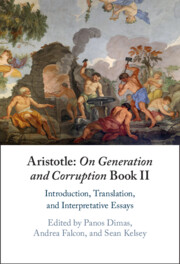 Aristotle: On Generation and Corruption Book II
Aristotle: On Generation and Corruption Book II Book contents
- Aristotle: On Generation and Corruption Book II
- Aristotle: On Generation and Corruption Book II
- Copyright page
- Contents
- Figures
- Tables
- Notes on Contributors
- Preface
- Abbreviations
- Part I Introduction and Interpretative Essays
- 1 On Generation and Corruption II
- 2 On Generation and Corruption II 1
- 3 On Generation and Corruption II 2
- 4 On Generation and Corruption II 3
- 5 On Generation and Corruption II 4
- 6 On Generation and Corruption II 5
- 7 On Generation and Corruption II 6
- 8 On Generation and Corruption II 7
- 9 On Generation and Corruption II 8
- 10 On Generation and Corruption II 9
- 11 On Generation and Corruption II 10
- 12 On Generation and Corruption II 11
- Part II Translation
- References
- Subject Index
- Index of Passages
10 - On Generation and Corruption II 9
from Part I - Introduction and Interpretative Essays
Published online by Cambridge University Press: 10 November 2022
- Aristotle: On Generation and Corruption Book II
- Aristotle: On Generation and Corruption Book II
- Copyright page
- Contents
- Figures
- Tables
- Notes on Contributors
- Preface
- Abbreviations
- Part I Introduction and Interpretative Essays
- 1 On Generation and Corruption II
- 2 On Generation and Corruption II 1
- 3 On Generation and Corruption II 2
- 4 On Generation and Corruption II 3
- 5 On Generation and Corruption II 4
- 6 On Generation and Corruption II 5
- 7 On Generation and Corruption II 6
- 8 On Generation and Corruption II 7
- 9 On Generation and Corruption II 8
- 10 On Generation and Corruption II 9
- 11 On Generation and Corruption II 10
- 12 On Generation and Corruption II 11
- Part II Translation
- References
- Subject Index
- Index of Passages
Summary
GC II 9 resumes the task announced already in GC I 3: explicating generation and corruption so as to account for the fact that these processes are ontologically distinct from alteration. Aristotle identifies the causes of generation and corruption with a view to explaining their contribution in bringing these processes about. First, the chapter discusses the material cause and identifies the kind of matter that functions as a cause of these processes. Rather than presenting matter as merely passive the chapter paints a picture of it as contributing to the causation of generation by supplying the capacities without which form would be unable to fulfill its forming function, and as contributing to that of corruption by its readiness to both lose properties and gain others. The chapter goes on to censure Aristotle’s predecessors for failing to point to an efficient cause of generation and corruption, even though they claim that identifying such a cause is a principal motivation for their theorizing. Though largely critical, this discussion is carefully calibrated to unveil essential features of the efficient cause and in that way prepare the account for this cause in GC II 10.
Information
- Type
- Chapter
- Information
- Aristotle: On Generation and Corruption Book IIIntroduction, Translation, and Interpretative Essays, pp. 192 - 215Publisher: Cambridge University PressPrint publication year: 2022